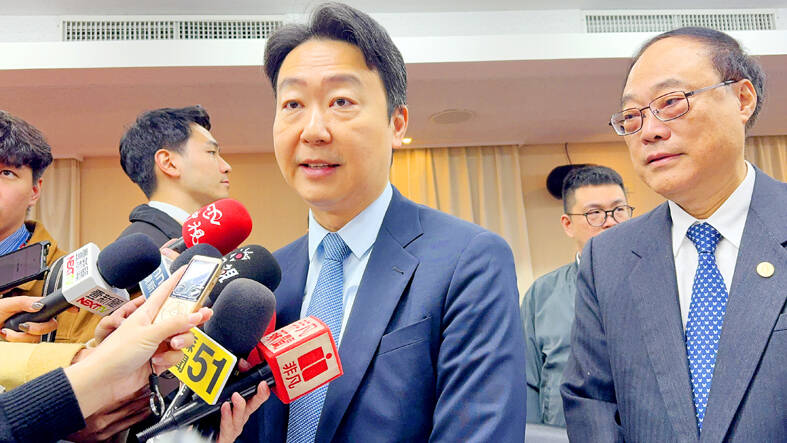Lawmakers yesterday engaged in a feverish debate during a meeting of the legislature’s Transportation Committee over whether the ban on tour group travel to China should be lifted. The debate followed remarks by Shanghai Vice Mayor Hua Yuan (華源) at the Taipei-Shanghai Twin-City Forum in Taipei on Tuesday.
The Ministry of Transportation and Communications was invited to give a report and discuss the possible reopening of cross-strait tourism.
Chinese Nationalist Party (KMT) and Taiwan People’s Party (TPP) legislators argued in favor of lifting the ban on group tours to China and providing reciprocal access to group tours from China, while Democratic Progressive Party (DPP) legislators accused the KMT and TPP of being scared to stand up to China on this issue.

Photo: Tsai Yun-rong, Taipei Times
If the People’s Republic of China (PRC) were to release definitive plans, Taiwan would begin serious discussions and enquiries into lifting the ban, Minister of Transportation and Communications Chen Shi-kai (陳世凱) said yesterday.
However, it must first ensure the safety of Taiwanese citizens, due to previous incidents of Taiwanese being detained or having phones searched in China, Chen said.
Taiwan allows independent tourists to travel from Taiwan to China. It temporarily relaxed restrictions on group travel from March to May, before banning them again in June. However, those who had already booked group trips before June were permitted to go ahead with their travel plans, with 230,000 having traveled as of October, Chen said.
Meanwhile, China has upheld restrictions on independent and group travel of Chinese citizens to Taiwan, except for those who have applied for official permission. Although residents from Fujian Province have been granted permission to travel in tour groups via ferry to the Taiwanese islands of Kinmen and Matsu, visitors have remained low, with only 32,000 Chinese visitors to Taiwan recorded through October, Chen added.
The national tourism industry has expressed hope that the group travel ban to China would be lifted. However, the number of travelers from Taiwan to China compared with from China to Taiwan clearly shows who ought to make the first move, DPP Legislator Lin Chun-hsien (林俊憲) said.
Democratic countries such as Taiwan are ruled by law, whereas China is not, so China can enforce arbitrary travel bans for political reasons whenever it wants, causing losses to Taiwan’s domestic tourism industry, DPP Legislator Tsai Chi-chang (蔡其昌) said.
The Tourism Administration should warn operators that the Chinese tourism business is filled with risks, and they should limit investment and resources to prevent losses, Tsai said.

Beijing could eventually see a full amphibious invasion of Taiwan as the only "prudent" way to bring about unification, the US Department of Defense said in a newly released annual report to Congress. The Pentagon's "Annual Report to Congress: Military and Security Developments Involving the People's Republic of China 2025," was in many ways similar to last year’s report but reorganized the analysis of the options China has to take over Taiwan. Generally, according to the report, Chinese leaders view the People's Liberation Army's (PLA) capabilities for a Taiwan campaign as improving, but they remain uncertain about its readiness to successfully seize

Taiwan is getting a day off on Christmas for the first time in 25 years. The change comes after opposition parties passed a law earlier this year to add or restore five public holidays, including Constitution Day, which falls on today, Dec. 25. The day marks the 1947 adoption of the constitution of the Republic of China, as the government in Taipei is formally known. Back then the Chinese Nationalist Party (KMT) governed China from Nanjing. When the KMT, now an opposition party in Taiwan, passed the legislation on holidays, it said that they would help “commemorate the history of national development.” That

Taiwan has overtaken South Korea this year in per capita income for the first time in 23 years, IMF data showed. Per capita income is a nation’s GDP divided by the total population, used to compare average wealth levels across countries. Taiwan also beat Japan this year on per capita income, after surpassing it for the first time last year, US magazine Newsweek reported yesterday. Across Asia, Taiwan ranked fourth for per capita income at US$37,827 this year due to sustained economic growth, the report said. In the top three spots were Singapore, Macau and Hong Kong, it said. South

Snow fell on Yushan (Jade Mountain, 玉山) yesterday morning as a continental cold air mass sent temperatures below freezing on Taiwan’s tallest peak, the Central Weather Administration (CWA) said. Snowflakes were seen on Yushan’s north peak from 6:28am to 6:38am, but they did not fully cover the ground and no accumulation was recorded, the CWA said. As of 7:42am, the lowest temperature recorded across Taiwan was minus-5.5°C at Yushan’s Fengkou observatory and minus-4.7°C at the Yushan observatory, CWA data showed. On Hehuanshan (合歡山) in Nantou County, a low of 1.3°C was recorded at 6:39pm, when ice pellets fell at Songsyue Lodge (松雪樓), a